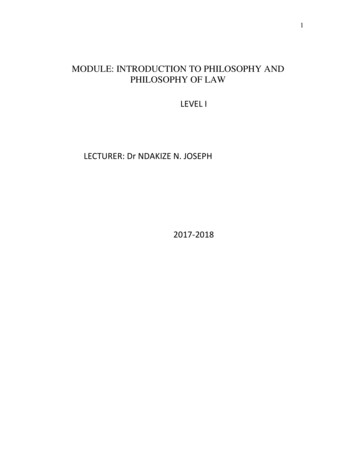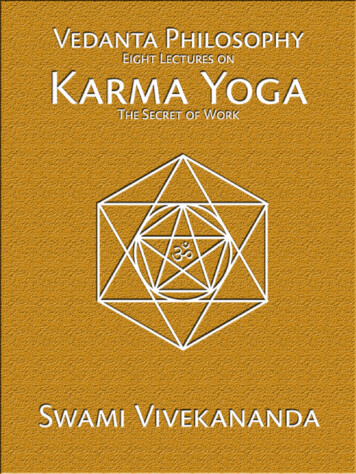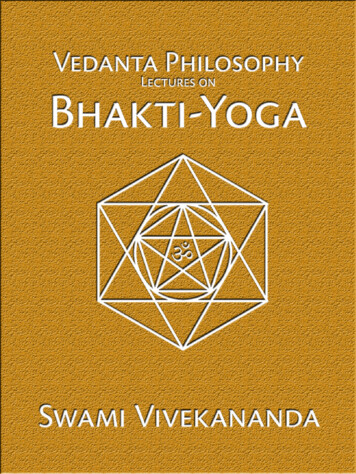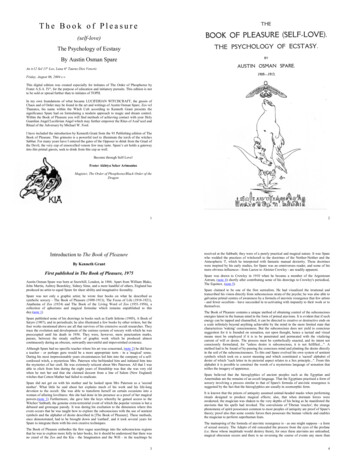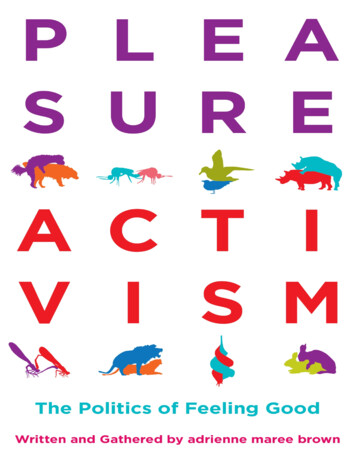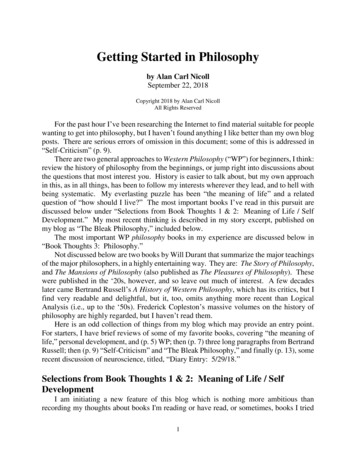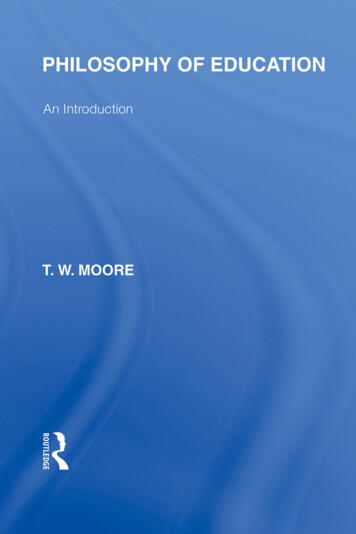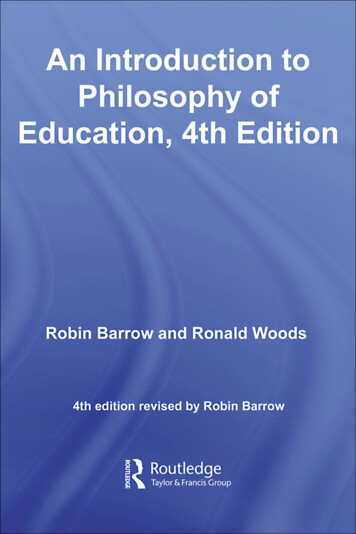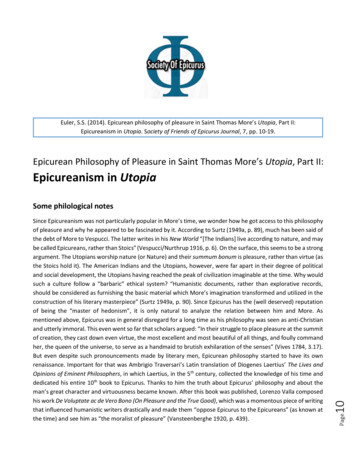
Transcription
Euler, S.S. (2014). Epicurean philosophy of pleasure in Saint Thomas More’s Utopia, Part II:Epicureanism in Utopia. Society of Friends of Epicurus Journal, 7, pp. 10-19.Epicurean Philosophy of Pleasure in Saint Thomas More’s Utopia, Part II:Epicureanism in UtopiaPageSince Epicureanism was not particularly popular in More’s time, we wonder how he got access to this philosophyof pleasure and why he appeared to be fascinated by it. According to Surtz (1949a, p. 89), much has been said ofthe debt of More to Vespucci. The latter writes in his New World “[The Indians] live according to nature, and maybe called Epicureans, rather than Stoics” (Vespucci/Nurthrup 1916, p. 6). On the surface, this seems to be a strongargument. The Utopians worship nature (or Nature) and their summum bonum is pleasure, rather than virtue (asthe Stoics hold it). The American Indians and the Utopians, however, were far apart in their degree of politicaland social development, the Utopians having reached the peak of civilization imaginable at the time. Why wouldsuch a culture follow a “barbaric” ethical system? “Humanistic documents, rather than explorative records,should be considered as furnishing the basic material which More’s imagination transformed and utilized in theconstruction of his literary masterpiece” (Surtz 1949a, p. 90). Since Epicurus has the (well deserved) reputationof being the “master of hedonism”, it is only natural to analyze the relation between him and More. Asmentioned above, Epicurus was in general disregard for a long time as his philosophy was seen as anti-Christianand utterly immoral. This even went so far that scholars argued: “In their struggle to place pleasure at the summitof creation, they cast down even virtue, the most excellent and most beautiful of all things, and foully commandher, the queen of the universe, to serve as a handmaid to brutish exhilaration of the senses” (Vives 1784, 3.17).But even despite such pronouncements made by literary men, Epicurean philosophy started to have its ownrenaissance. Important for that was Ambrigio Traversari’s Latin translation of Diogenes Laertius’ The Lives andOpinions of Eminent Philosophers, in which Laertius, in the 5th century, collected the knowledge of his time anddedicated his entire 10th book to Epicurus. Thanks to him the truth about Epicurus’ philosophy and about theman’s great character and virtuousness became known. After this book was published, Lorenzo Valla composedhis work De Voluptate ac de Vero Bono (On Pleasure and the True Good), which was a momentous piece of writingthat influenced humanistic writers drastically and made them “oppose Epicurus to the Epicureans” (as known atthe time) and see him as “the moralist of pleasure” (Vansteenberghe 1920, p. 439).10Some philological notes
It is likely that especially important for Thomas More was Desiderius Erasmus. Early in his career Erasmus, oneof the most significant humanistic scholars and a good friend to More, wrote his work De Contemptu Mundi (OnContempt for the World) in which he argues clearly pro-Epicurean, most probably being familiar with Laertius’and/or Valla’s respective books. That Erasmus was very fond of Epicurean philosophy becomes very clear in hislater colloquy The Epicurean. This also coincides with More’s position toward the alleged contradiction betweenEpicureanism and Christianity he should logically have disapproved of, since Erasmus himself wrote “none aregreater Epicureans than those Christians that live a pious life” (Colloquies, 2, p. 327).Religion and the fear of GodFrom a religious point of view, Epicurus would earn great disdain from the Utopians, since he strictly denies thethree fundamental truths every Utopian has to believe: the immortality of the human soul (1), the providence ofGod (2) and retribution in a future life for good and evil deeds (3). Epicurus’ position, however, has to beunderstood in the context of his time. In classical antiquity the Olympian gods were seen as selfish and oftenacted in arbitrary and excessive manners, therefore people constantly had to literally fear something mayhappen to them, in both this and the next life. This is quite different to modern Christianity or Buddhism, whichpromote the development of ones [‘God given’] intellect in order to live a moral life, rather than producingsacrifices and engaging in bizarre rituals to please their gods (see Keown 2005, Long 2010). Without theelimination of superstitious fears on the one hand, and anxiety towards death on the other, Epicurean ataraxiawould be difficult to imagine. Therefore Epicurus portrays the gods as absolutely indifferent to human affairs,existing in their own realm without influencing human actions whatsoever, and even goes so far as to say thatthere is no afterlife, thus eliminating (religious) concerns about death entirely. Christian philosophers like Moreor Erasmus, on the contrary, were convinced that the highest pleasure lies exactly in God’s eternal rewards ofone’s good and righteous actions. There are, however, aspects of Epicurean philosophy that work in concordancewith the pro-Christian philosophy as expounded in Utopia. The Roman author Lucian (Lat. Lucianus Samosatensis;not to be confused with Titus Lucretius Carus), several of whose works were translated by More and Erasmus,frequently refers to both Christians and Epicureans in his works. In his Pseudomantis, Lucian tells of Alexanderof Abonoteichus (ca. 105-170 AD), a fraudulent ‘oracle monger’ who deeply hated both Christians and Epicureansas his enemies, the former because their faith is too deep-rooted, the latter because they consider his tricksridiculous and are immune to religious pretenders like him. Commenting on the fact that Alexander burnedEpicurus’ writings, Lucian saysPageThe Utopians do not fear specters and portents and have a very clear and positive image of God, and, indeed,the Old Testament also goes to great lengths to show how the religious cults of the Levant and Asia Minor arenothing short of ridiculous. Religion, for the Utopians, equals following rationality, or “a sane mind”, to useLucian’s words. Their deity is Nature, and the only way to please Nature is, for one, leading a sensible andrighteous life, and, for another, living life with pleasure, for if it is righteous to help others live a pleasant life, andit would be unnatural to deny it to oneself:11That impious character did not at all consider how great advantage that volume would bring to those whoset themselves to reading it, and how great peace, tranquility and liberty it would produce in them, for thereason that it would release them from bondage to fears, spectres, and portents, and would take away vainhopes and unbridled desires, and would implant a sane mind and the truth, and would thoroughly purify thesoul by right reason as well as freedom. (Erasmus, Opera Omnia, 1, p. 240-41).
After all, you’ve a duty to yourself as well as to your neighbour, and, if Nature says you must be kind toothers, she can’t turn round the next moment and say you must be cruel to yourself. The Utopians thereforeregard the enjoyment of life – that is pleasure – as the natural object of all human efforts, and natural, asthey define it, is synonymous with virtuous. (Utopia, p. 73).In this respect, Utopian religion and Epicurean philosophy of pleasure are extremely similar, and the type of godsEpicurus rejects are miles apart from the Utopian “Nature” or the Christian “LORD”. Though Epicurus still doesdeny the three Utopian ‘fundamental truths’, the consequences for people’s lives, here spiritually motivated,there purely philosophically motivated, are widely identical.On the Nature of PleasureEpicurus clearly teaches that mankind’s highest good is pleasure, as opposed to the teachings of most otherancient philosophers, who establish virtue as the highest good. In his Letter to Menoeceus, Epicurus writesPleasure is the beginning and the end of a felicitous life. We realized that it is the first and innate good andwe take it as the starting-point for every choice and aversion and to it we always come back when we assessa good. (Epicurus, Letter to Menoeceus)Pleasure Epicurus defines as the absence of pain and reckons it a matter of course that every creature strive forthe largest amount of pleasure and the least amount of pain. These aspects we find apprehended by Erasmus inhis The Epicurean, in which he allows Hedonius to call the sentiment of Epicurus “divine”, since he “places theHappiness of Man in Pleasure, and judges that Life to be most blessed, that has most Pleasure, and least Pain”(Colloquies, 2, p. 327). To Epicurus every pleasure is good and desirable, but not every pleasure should beindulged. This is because some action can ultimately produce greater pain than the initial pleasure it provided,or become an actual hindrance to future pleasure. Epicurus offers us a clear principle of selection, however:Oftentimes we don’t take every pleasure, but pass over many of them in order to avoid a greater annoyanceensuing from them; the same way we prefer many pains to pleasures if enduring these pains brings agreater pleasure as a consequence. [Therefore] not all pleasure is choiceworthy [but] by measuring aspectsof utility against aspects of harm we are able to assess things properly. (Epicurus, Letter to Menoeceus).Page12This is again a principle which would please a strictly Catholic person like Thomas More, since such a person isneither desirous of becoming rich, nor of obtaining any kind of social status. The same holds true for theUtopians, who not only do not desire riches, but who disdain them, and whose state system does not even makeit possible pursuing a course leading to social status and power by pleasing their superiors or engaging inintrigues. Their election system necessitates possible candidates to have proven themselves trustworthy andvirtuous. The Utopians’ disdain for riches becomes obvious in the description of the day when a legation ofFlatulentines (people of a neighboring nation) arrived in Utopia, all dressed up with cloth of gold, great goldenchains, rings, glittering robes and things of this kind. When they walked through the town, the Utopians thoughtthey were slaves. The children made fun of them for wearing jewelry as adults and the Utopian diplomatsaddressed the Flatulentines’ slaves, who they reckoned to be the officials (Utopia, p. 68). This is because theUtopians all wear the same type of fairly crude clothes and put their gold on slaves as they see absolutely novalue in it and use it merely for indicating that someone is a slave and for keeping them bound to their
workplace1. The Utopians realize that allowing people in any given society to prank themselves with certaingoods is a source of anger, envy and eventual hatred. Indeed, they see the pursuit of virtue as a valid alternativeto fulfill the socio-psychological desire to positively set oneself apart: “the Utopians strongly disapprove of makeup [ ]. A pretty face may be enough to catch a man, but it takes character and good nature to hold him” (Utopia,p. 86). This is further substantiated by the way they spend their spare time, i.e. with studying and readingintellectual works, rather than gambling or reading trivia.The depiction of the Utopians’ way of life is conducive to the understanding of the nature of Utopian pleasure.In a society such as the Utopians’, material goods are only available to a limited extent. Food, clothes, houses,means of transport, everything is organized by a central administration and distributed equally in quantity, aswell as quality. For Utopians, the only pleasures they can easily attain are intellectual ones, and by training theirminds – as mentioned before the usual way of spending one’s (limited) spare time – they realize that this is, as amatter of fact, the wisest type of pleasure anyway. Thus, the way their society as well as their private lives areorganized forces them, in a sense, into such a perception of pleasure. However, their studies allow them torealize that this way of life is not just some kind of totalitarian ideology or some redundant cultural habit, but,indeed, the best way to go.1Note that Utopians do not engage in any kind of slave trade. Rather, criminals and prisoners of war, instead of facingdeath or imprisonment, lose their freedom and enter a state of slavery (which is forced labor and does not comprisebarbaric practices as known from factual history).PageIt must be noted that the Utopians add another rule of selection to the two already mentioned (i.e. that joy mustnot interfere with greater pleasures or cause unpleasant aftereffects). They state that we are also “impelled byreason as well as an instinct to enjoy ourselves in any natural way which doesn’t hurt other people” (Utopia, p.74). That means pleasure must not be obtained by wrong or injustice. Epicurus does not mention this as a rule13This latter point deserves some further explanation. If the organization of a country and the habitual way of livingwere the only drives behind a philosophy of pleasure, it is likely that people in a democratic society would rejectit eventually as they shape their own opinions. Let us consider common behavior patterns in our society. Forexample, every once in a while fashion changes and many people feel the urge to go and buy the latest fashionin order to increase their feeling of personal worth, even though they may have better use for their money.Another example is make-up. A good amount of people spend hours and lots of effort and energy to wear makeup as they consider perfect for going out, though the utility of this is minimal. As a last example the obsessionfor cars in some cultures could be mentioned: people take the higher risk of robbery and of costly repairs andexpensive insurances upon themselves, just so as to be able to drive a very expensive car for the purpose ofmaking people aware of their personal dignity, as it were. Of course the people in all these cases are convincedthat this is simply great and to their taste, but if they were in different positions, this perception would changeto some extent as well, for society has a very strong influence on what people come to like or not. The moreintellectually and philosophically educated people become, the more they realize that such things areinsignificant, and that ensuing consequences may well not be worth the pleasure gained by it. Thus, if the Utopianway of life was shaped by habits as described, such a universally intellectual society would most probably discardthem in no time. Now it could be argued (even though the history of philosophy has shown that this is veryunlikely) that they just did not have any intellectual breakthroughs and that their philosophy simply reemphasizes what they are used to, but the fact that Hythlodaeus brought them the writings of the greatest Greekand Roman philosophers and that they were able to fit these teachings easily into their own concepts suggeststhat their philosophy of pleasure seems to have some universal value of its own.
of selection, but he mentions the avoidance of crime in his passages against the “disturbance of the soul”,referring to the pains of a guilty conscience. This position is also obvious in his passages about friendship, in thecontext of which immoral behavior is clearly unacceptable as well. This aspect will be discussed in depth in thesection on virtue of this article.On the Criteria of PleasureBy pleasure, Epicurus means “the absence of pain in the body and of disturbance of the soul”. This is the greateststate of happiness that can be attained. The Cyrenaics, for instance, argue that pleasure cannot exist in rest andis only achieved by motion. For Epicurus, however, pleasure can arise from tranquility as well as from motion.The latter, however, is inferior since it cannot exist without discomfort. Pleasure arising from motion is achievedthrough the satisfaction of desires, but desires, being an absence of something, are necessarily accompanied bydiscomfort, as for example hunger. This very much coincides with the opinion of the Utopians, who would arguein this context that “undoubtedly, these pleasures should come right at the bottom of the list, because they areso impure [ ] for the pain [preceding the pleasure] is both more intense and more prolonged” (Utopia, p. 78).The Epicurean in Cicero’s De Finibus Bonorum et Malorum (On the Ends of Good and Evil) gives a good accountof the Epicurean position toward the allegedly neutral state between pleasure and pain, that is when there is nomotion involved:PageNot only Epicurus holds this position, but the Utopians very much agree, as portrayed by their cultural conceptof health and illness. Even without the help of external pleasures, the “calm and regular functioning of the body”is considered the greatest pleasure in life and the basis of all others. It does not take much to believe this point,since an omnipresent pain, even a slight one, is always ‘just a bit’ disturbing, and this re-occurrence can growinto great disturbance in its own right. To take an example, probably everyone knows the difference between agood night’s sleep or a body that is being kept forcefully awake after just a few hours of sleep. Even though thereis no pain as such, it is very hard to feel and enjoy pleasures, so all it takes is to extend the definition of pain togeneral illness of the body or the mind. The Utopian argument goes like this: “illness involves pain, which is thedirect opposite of pleasure, and illness is the direct opposite of health, therefore health involves pleasure”(Utopia, p. 77). In ancient philosophy this physical state without pain was referred to as ἀπονία (aponia). Morecompares this circumstance to a battle fought by the body. Once victory over illness is achieved, the body doesnot just fall into a coma. It would hardly be possible not to feel the refreshment and to take advantage of thebody’s ‘victory’. In this context More also clearly argues that “[e]veryone’s perfectly aware of feeling well, unlesshe’s asleep or actually feeling ill. Even the most insensitive and apathetic sort of person will admit that it’sdelightful to be healthy – and what is delight, but a synonym for pleasure?” (Utopia, p. 78). For both Epicurusand the Utopians the concept of physical health applies just as well to mental well-being, since a troubled mindis just as disturbing as great physical pain. Generalized anxiety disorder (GDA), for example, is characterized byexcessive and often irrational worrying. Over 50% of people have been found to worry every day or every two tothree days (Freeman & Freeman, p.87), and it is not clear where worry ends and where a ‘disorder’ begins. Peoplewho ever faced any kind of anxiety or depression will know how mind-destroying this can be in the long run, andhow it could easily be defined as the diametrical opposite of pleasure or happiness. Therefore, it is not surprising14there is no such thing as a neutral state of feeling intermediate between pleasure and pain; for the statesupposed by some thinkers to be neutral, being characterized as it is by entire absence of pain, is itself, heheld, a pleasure, and, what is more, a pleasure of the highest order. A man who is conscious of his conditionat all must necessarily feel either pleasure or pain (Cicero, De Finibus, p. 43).
that a state of physical and mental tranquility (aponia and ataraxia) is Epicurus’, as well as the Utopians’ summumbonum, and that when it comes to active pleasures, both agree on accounting the mental ones superior to thecorporal ones. Mental pleasures include “the satisfaction that one gets from understanding something, or fromcontemplating truth. They also include the memory of a well-spent life, and the confident expectation of goodthings to come” (Utopia, p. 76). Whereas the first point stresses the study of philosophy and quality literature,the second point is something Epicurus himself emphasized, a point that earned him great adoration. Epicurusdied of kidney failure, a highly painful death that includes a time of great suffering, but “the master of serenity”is said to have kept his ataraxia and his positive and inspiring spirit. He used to say that he can nourish his mindwith all the memories of a great life and of his friends and disciples, who loved and adored him, and like that hecould feel pleasure even in great pain, so much stronger are indeed the mental pleasures and pains than thephysical ones.Such cognitive pleasures can be past or future-directed. Positive expectation is something that most peopleprobably experienced at some point of their lives: by intensively imagining a pleasant (possible) future situation,one is able to feel it almost as intensely as it would really be and the mental excitement and pleasure evoked bydoing so is very strong. This kind of visualization is an aspect also sometimes utilized in psychotherapy andpsychology of motivation. The strong feeling of this future expectation may very well enable one to go throughunpleasant situations or to endure hard labor. Purely physical pleasures, as achieved through “replacing physicalsubstances”, “discharge of excess” or “relief or irritation” (Utopia, p. 76f) are temporal and can impossibly havesuch a strong effect on a person. Of course the Utopians believe in enjoying good food, drink and so forth andare “grateful to Mother Nature for encouraging her children to do things that have to be done so often, by makingthem so attractive” (Utopia, p. 78f), but the point has been made that these pleasures are significantly inferiorto the pleasure of mental and physical health and to the different types of mental pleasures2.As indicated before, a last criterion of pleasure for the Utopians is God. “For the Utopians man’s highest good isGod in Whom, above every created thing, man is to find his joy and gladness” (Surtz 1957, p. 15). One of theUtopians’ motivations for being virtuous and furthering others’ pleasure is because they fear punishment in thenext life; another is that they believe in the providence of God in ordaining human beings to happiness. As notedbefore, Epicurus defied such teachings because the superstitions of fearing the ancient Greek deities was anutterly unnecessary disturbance of the soul and hindered the free pursuit of good pleasure. Nonetheless, evenAugustine said in his Confessions: “Epicurus would certainly have won the palm in my judgment if I had notbelieved that after death there remained life for the soul and treatment according to its deserts, which Epicurusdid not hold” (Augustine, Confessions, p. 127). Likewise, it did not take much for Erasmus and More to ‘correct’Epicurus and to add the Christian doctrine of an afterlife to his philosophy. Owing to this combination, theUtopians have a variety of very strong and fruitful criteria for achieving pleasure at their disposal.2Scholars in the field of research on Epicureanism designate these two types of pleasures “kinetic” and “katastematic”.Kinetic, referring by definition to physical movement, are temporary and inferior pleasures, whereas katastematicpleasures, first and foremost the freedom from pain (aponia) and the state of serenity (ataraxia), are lasting and superiorto the others (compare Held 2007).PageThe Utopians consider mental pleasures of primary importance and attribute them mostly to good behavior anda clear conscience (Utopia, p. 78). But how is a clear conscience achieved and what defines good behavior? Inother words, how does pleasure relate to virtue? Preliminarily it needs to be mentioned that the philosophical15The Pursuit of Virtue: Versus the Disturbance of the Soul
definition of virtue differs somewhat from the colloquial one. The Oxford Advanced Learner’s Dictionarydescribes virtue 1) as “behaviour or attitudes that show high moral standards: He led a life of virtue; She wascertainly no paragon of virtue!”, 2) as “a particular good quality or habit: Patience is not one of her virtues, I’mafraid” and 3) as “an attractive or useful quality: The plan has the virtue of simplicity; They could see no virtue indiscussing it further”. In philosophy, the second sense, that of a “particular good quality” is of prime importance.This quality may then ideally develop into a habit (i.e. be internalized) and shape high moral standards and goodbehavior.Prudence (Greek φρόνησις (phronēsis), Latin prudentia “foresight, sagacity”) is the virtue that enables us to judgebetween right and wrong, which, in the context of hedonism, is between pains and pleasures. Some philosopherssee prudence as the highest virtue of all and Epicurus even calls it “greater and more valuable than philosophy”3.He writes to Menoeceus[prudence] is the source of all other virtues, for it teaches that we cannot lead a life of pleasure which is notalso a life of prudence, honor and justice; nor lead a life of prudence, honor and justice, which is not also alife of pleasure. For the virtues have grown into people with a pleasant life, and a pleasant life is inseparablefrom them. (Epicurus, Letter to Menoeceus)Accordingly, pursuing pleasure is not possible without relying on prudence (remember that pleasure is found ina state of ‘tranquility of the soul’), and prudence teaches us that pleasure can only be achieved through anhonorable and just life. Once such a life is led, pleasure is thought to follow as an inevitable consequence.This, to some extent, is the foundation of Utopian society. It is part of our idea of good social behavior, especiallyamong friends, to prove oneself grateful when being helped out with something or if one received any kind ofbenefit owing to another person’s acts. In other words, furthering one’s neighbors’ pleasures gets them tofurther one’s own pleasure in return. In Utopian society people are “positively obliged to make it possible forthem” and “you’ve a duty to yourself as well as to your neighbour” (Utopia, p.73). So far it is not clear, though,if this only happens in order to take advantage of ones fellow citizens, or if this motivation results from theconviction to lead an honorable, just and virtuous life, as mentioned before. On justifying the pursuit of pleasure,More writes that[such attempts to improve the human situation are] laudable acts of humanity for obviously nothing couldbe more humane, or more natural for a human being, than to relieve other people’s sufferings, put an endto their miseries, and restore their joie de vivre, that is, their capacity for pleasure (Utopia, p. 72).3Note that “philosophy” means “love of wisdom” (from σοφία (sophia) “wisdom“), so that he prioritizes prudence overwisdom per se.PageIt’s wrong to deprive someone else of a pleasure so that you can enjoy one yourself, but to deprive yourselfof a pleasure so that you can add to someone else’s enjoyment is an act of humanity by which you alwaysgain more than you lose. For one thing, such benefits are usually repaid in kind. For another, the mere sense16This attitude is also depicted in the Utopians’ intensive care for the sick in hospitals. Many philosophers whocriticized Epicurus held that virtue is the highest good, not pleasure, and that virtue ought to be sought for itsown sake and not in order to obtain something else (like pleasures). Based on the above quote it seems that theUtopians also consider noble deeds or virtue humane and good for their own sake, but this is qualified soon after(though I encourage the reader to judge if this really reduces the ethical value of the philosophy portrayed here):
of having done somebody a kindness, and so earned his affection and good will, produces a spiritualsatisfaction which far outweighs the loss of a physical one. And lastly [ ] God will reward us. (Utopia, p. 73).PageIn the role of human conscience, Epicurus, the Utopians and Thomas More stand especially united. Epicurus heldit that it is absolutely unacceptable to commit crimes. Both for the fear to be caught and for the resulting guiltyconscience (which would mean a significant disturbance of the mind), both of which making true pleasureimpossible. For the Utopians, criminality is against everything they were shown to stand for and thereforepractically impossible (though there are always ‘black sheep’ everywhere). Thomas More himself refused toaccept Henry VIII’s position as supreme head of the church since this is the role of the Holy Father in Rome alone,and would mean a separation from his Holy Catholic Church. Owing to his refusal of signing a paper statingapproval and loyalty of and to the king, respectively, Thomas More was forced into martyrdom. His conscienceas a true catholic with his irrevocable faith in the Roman Catholic Church and in the good nature of human beingsdid not allow him to turn his back on the Holy Chair and to accept Henry’s unchristian reign of violence. In suchcases Thomas More, as well as his Utopians, are able to rely on a source of strength Epicurus did not need: God.Epicurus came to think that the classical Greek gods are mere fairytales and that some kind of deity probablycreated the world but has no influence on it anymore. For him it was important to dissolve the fear of all thesegods, since unjustified fear is a great and unnecessary trouble of the mind, as has been elaborated before. InUtopia a divine reward for a virtuous and moral life is mentioned many times and Erasmus (taking a ratherextreme position as will be shown shortly) in The Epicurean equates pleasure with piety, because a person wholives piously “enjoys the true Good,” for it is “only Piety that gains the Favour of God, the Fountain of the chiefestGood, that makes a Man happy” (Colloquies, 2, p. 330). Wherever one may personally stand as regards religiousfaith, practiced in a pure and virtuous way as religious philosophers, be it Christian, Buddhist, Taoist, Jainist or of17Disregarding the litt
May 07, 2014 · Epicurean Philosophy of Pleasure in Saint Thomas More [s Utopia, Part II: Epicureanism in Utopia Some philological notes Since Epicureanism was not particularly popular in Mores time, we wonder how he got access to this philosophy of pleasure and why he appeared to be fascinated by it.
